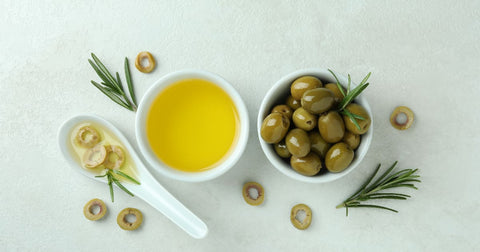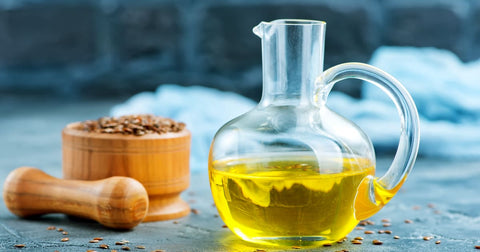Olive oil, a cornerstone of the Mediterranean diet, has been celebrated for centuries for its flavor and potential health benefits. But with increasing discussions about the pros and cons of different cooking oils, you might be wondering, "Is olive oil a seed oil?"

This comprehensive guide will answer that question, delve into the health benefits of olive oil, and explore why it's often considered a superior alternative to many seed oils.
Understanding Seed Oils
Seed oils are extracted from the seeds of various plants, including:
-
Sunflower
-
Canola
-
Soybean
-
Corn
-
Grapeseed
While some seed oils can be part of a healthy diet, others are highly processed and contain high amounts of omega-6 fatty acids, which, when consumed in excess, can contribute to inflammation.
What are Seed Oils?
Seed oils are extracted from the seeds of various plants. They are often used in cooking and food processing due to their affordability and versatility.
Is Olive Oil a Seed Oil?

No, olive oil is not a seed oil. It's extracted from the flesh of olives, which are fruits, not seeds. This makes it a fruit oil, similar to avocado oil.
Is Olive Oil Good for You?
Yes, olive oil is considered one of the healthiest oils with a wide range of potential benefits:
-
Heart-Healthy Fats: Olive oil is rich in monounsaturated fatty acids (MUFAs), particularly oleic acid, which can help lower "bad" LDL cholesterol and raise "good" HDL cholesterol.
-
Antioxidant Powerhouse: It's packed with antioxidants, including polyphenols, which can protect your cells from damage and reduce inflammation.
-
May Reduce the Risk of Chronic Diseases: Studies suggest that olive oil consumption might be associated with a lower risk of heart disease, stroke, type 2 diabetes, and certain types of cancer.
-
Supports Brain Health: The healthy fats and antioxidants in olive oil may contribute to cognitive function and protect against age-related decline.
-
Versatile in the Kitchen: Olive oil can be used for various cooking methods, from sautéing and frying to salad dressings and marinades.
Benefits of Olive Oil: A Mediterranean Staple
Olive oil has been a cornerstone of the Mediterranean diet for centuries, and its numerous health benefits are well-documented.
Seed Oils to Avoid: Making Informed Choices
While some seed oils can be part of a healthy diet, it's best to limit or avoid highly processed seed oils, such as:

-
Soybean oil
-
Corn oil
-
Cottonseed oil
-
Sunflower oil
-
Canola oil (rapeseed oil)
These oils are often extracted using high heat and chemical solvents, which can damage their nutritional value and create harmful byproducts. They are also typically high in omega-6 fatty acids, which can contribute to inflammation when consumed in excess.
Food Intolerance and Digestive Health
If you experience digestive issues after consuming olive oil or other foods, consider the possibility of food intolerances or sensitivities. These can trigger inflammation and disrupt your gut health.
Food Sensitivity Test Kit: Identify Your Triggers
A food sensitivity test kit can help you identify specific foods that might be triggering your symptoms. By eliminating or reducing these trigger foods, you can potentially alleviate your digestive problems and improve your overall gut health.
Key Takeaways:

-
Olive oil is a healthy and versatile fruit oil, not a seed oil.
-
It offers various benefits, including heart-healthy fats, antioxidants, and potential anti-inflammatory properties.
-
Consider switching from heavily processed seed oils to olive oil for a healthier choice.
-
If you experience digestive issues after consuming olive oil, consider a food sensitivity test to identify potential food intolerances.
Remember, this article is intended for informational purposes only and should not be considered a substitute for professional medical advice. If you have any concerns about your health or dietary choices, consult a qualified healthcare professional.
Frequently Asked Questions:
1. What are the different types of olive oil?
Olive oil comes in various grades, including extra virgin, virgin, and refined. Extra virgin olive oil is the highest quality, extracted from the first cold pressing of the olives and offering the most robust flavor and nutritional benefits.
2. Is olive oil suitable for high-heat cooking?
While olive oil has a relatively high smoke point (the temperature at which it starts to break down), it's best to use it for moderate-heat cooking methods like sautéing or baking. For high-heat cooking like frying, consider using avocado oil or coconut oil, which have higher smoke points.
3. How can I incorporate more olive oil into my diet?
Use it as a base for salad dressings, drizzle it over cooked vegetables or pasta, use it for dipping bread, or incorporate it into marinades for meat or tofu.
4. Can I use olive oil for skin care?
Yes, olive oil can be used topically to moisturize and nourish the skin. It's rich in antioxidants and healthy fats, which can help improve skin elasticity and hydration.
5. I'm experiencing digestive issues after consuming olive oil. Could it be a food intolerance?
While olive oil is generally well-tolerated, it's possible to have a sensitivity to it. If you experience digestive discomfort after consuming olive oil, consider a food sensitivity test to identify potential triggers and make informed dietary choices.


.png?v=1737390083)
.png?v=1737187409)


